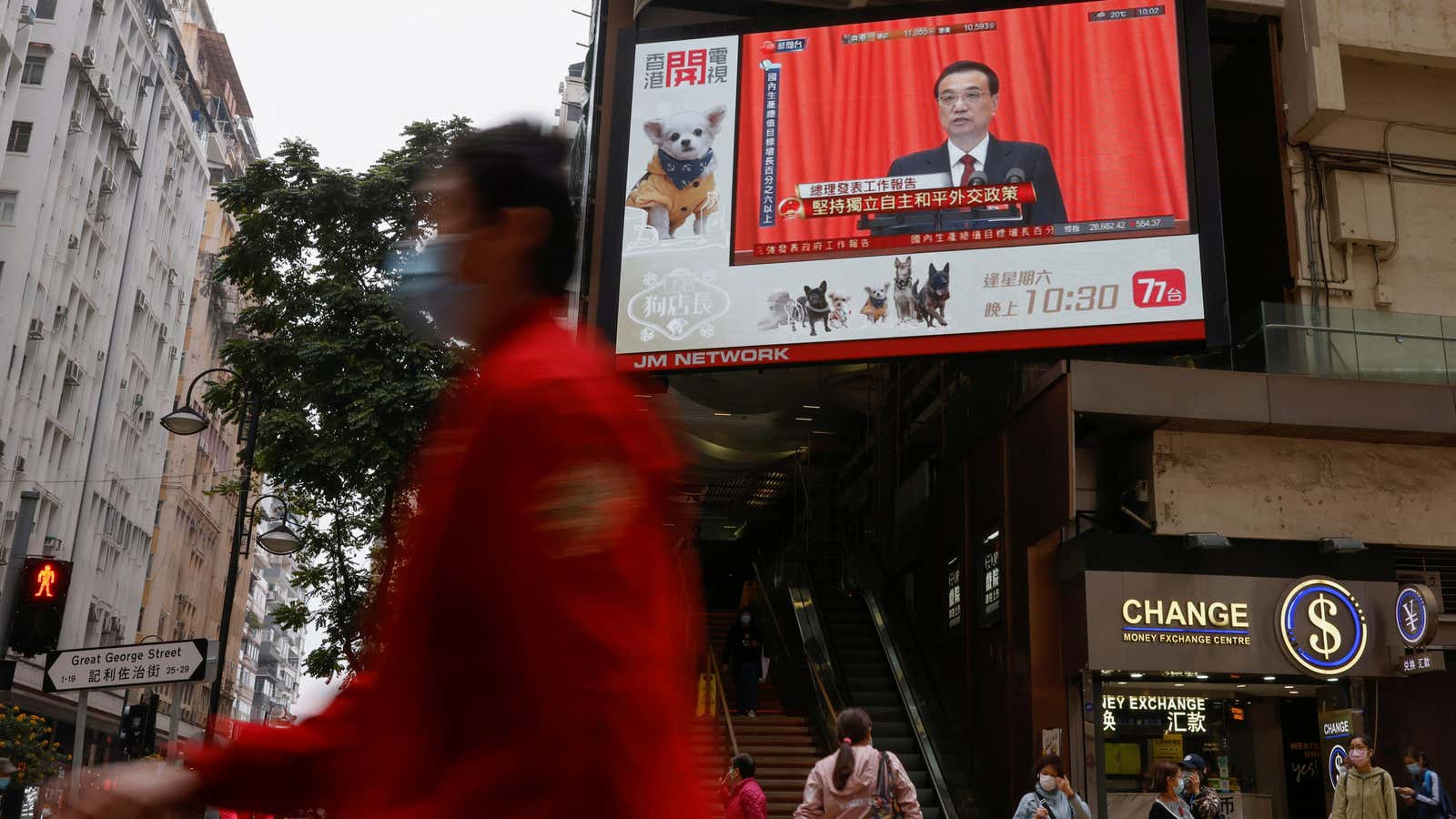If political crackdowns go through different stages, it might be said that Hong Kong last week entered the absurdist phase.
It was only in November 2019 that pro-democracy Hong Kongers popped champagne on the streets to celebrate a landslide victory in local district-level elections— the city’s only fully democratic polls. The pro-democracy camp’s overwhelming win was a stunning and embarrassing defeat for Beijing, and charted a way in which the momentum from mass protests could be channelled into political power, even within a flawed system that’s rigged against the opposition.
Barely 16 months on, elections in any meaningful sense of the word look to soon be a relic of the past in Hong Kong.
At the start of its annual Two Sessions political gathering—which last year brought in a draconian national security law—Beijing made its long-expected announcement of an overhaul of Hong Kong’s electoral rules. The central government touted the revamp as “improvements” to how elections are conducted. The claim isn’t entirely inaccurate, if one gauges the quality of an electoral system on the basis of how much control it grants the government over politics.
Rigging a rigged system
Here’s a quick recap of how Hong Kong’s elections work right now. At the local neighborhood level, where district councillors are mostly concerned with pest control and new bus routes, almost all seats are directly elected. Going up a rung to the legislative level, elections are less free and defined by a complex system that ends up favoring pro-government interests. The 70 seats that make up the local legislature are split equally between directly elected seats, and so-called “functional constituencies” representing business and professional groups overwhelmingly loyal to Beijing and big business. Finally, the election for the highest office is the least free of all: the chief executive is picked by a 1,200-member committee that’s largely Beijing-friendly.
The new rules, which are all but certain to be approved on Thursday by China’s rubber stamp legislature, effectively give Beijing direct say over who gets to run for elections in Hong Kong. For an electoral system that was already heavily rigged against any opposition, the latest changes now make it essentially impossible for any opposition candidates to even stand for office.
They include the following:
- Expanding the 1,200-member election committee, which selects the chief executive, to 1,500 members. The additional 300 members could be drawn from pro-Beijing groups, like businesses and academic organizations.
- Removing district councillors from the election committee. District councillors are overwhelmingly pro-democracy figures after the opposition’s November 2019 sweep. The district councillors currently have 117 of the 1,200 election committee seats, giving them some say over who gets to be chief executive. Beijing deems that to be too risky.
- A mechanism to weed out politicians who aren’t “patriots.” The powerful body is expected to investigate whether potential candidates love the Communist Party sufficiently.
- Expanding the legislature, and requiring the election committee to nominate legislators. The 70-seat Legislative Council (LegCo), already devoid of opposition members after Beijing engineered their expulsion, will grow to 90 seats. The election committee, packed with pro-Beijing members, will have the final say on who gets to be a LegCo member.
“These quantitative changes will bring about qualitative changes: not democratization, but to de-democratization and de-liberalization,” wrote (link in Chinese) Kenneth Chan, professor of politics at Hong Kong Baptist University and a former pro-democracy lawmaker.
Out with “loyal garbage,” in with “virtuous patriots”
If Beijing is intent on destroying all opposition and cementing total control over Hong Kong, then why bother continuing with the pretense of elections?
Pro-Beijing politicians will say elections under the new rules will pave the way for a more “representative“ legislature and eventually a fuller democracy, but a rich body of political research suggests the answer lies elsewhere: authoritarians use elections to hold onto power.
This can be done in several ways, the political scientists Jennifer Gandhi and Ellen Lust-Okar explained in their paper on authoritarian elections. As an institutional tool, elections can help authoritarian co-opt elites or other groups in society. The elections also a way of rewarding loyal elites with the spoils of office and privilege, keeping them happy and in line. Years and years of uncontested elections, in which party loyalists invariably win landslide victories, also serve as signals of state power and that any opposition is doomed to fail.
Authoritarian elections can also serve as exercises in “competitive clientelism, wherein candidates vie” to demonstrate loyalty to the top, write Gandhi and Lust-Okar. For over two decades, Hong Kong’s pro-government politicians and prominent businesspeople served as Beijing’s intermediaries. But their failure to ameliorate the groundswell of anti-government sentiment—and in some cases the appearance of empathy for young activists—appears to have cost them precious trust and credibility. Now Beijing appears to want even those in the establishment to prove that they are what a prominent Chinese academic called (link in Chinese) “virtuous patriots,” rather than “rubber stamps or loyal garbage.”
Finally, elections can provide a way to co-opt and divide the opposition—though Beijing’s recent changes, such as giving itself the power to directly disqualify lawmakers, appear to have done the opposite. Nevertheless, the academic argues that the moment has come for Hong Kong’s pro-democracy opposition to find a new way of being a “loyal opposition.”
In sum, Hong Kong will have more representation with fewer voters, and opposition is welcome, as long as it refrains from criticizing, obstructing, or rejecting.
Against this backdrop, the challenge for activists, the opposition, and ordinary Hong Kongers alike perhaps boils down this: how does one punch through the state-imposed absurdity to expose it for what it is—and more importantly, to prevent the absurdity from being normalized?
Online, popular sentiment suggest many Hong Kongers are well aware of the absurdity and fed up of Beijing-designed “elections with Hong Kong characteristics.”
“Just make direct appointments,” wrote one user. “Don’t waste money on fake elections. Better to just distribute the cash!”
